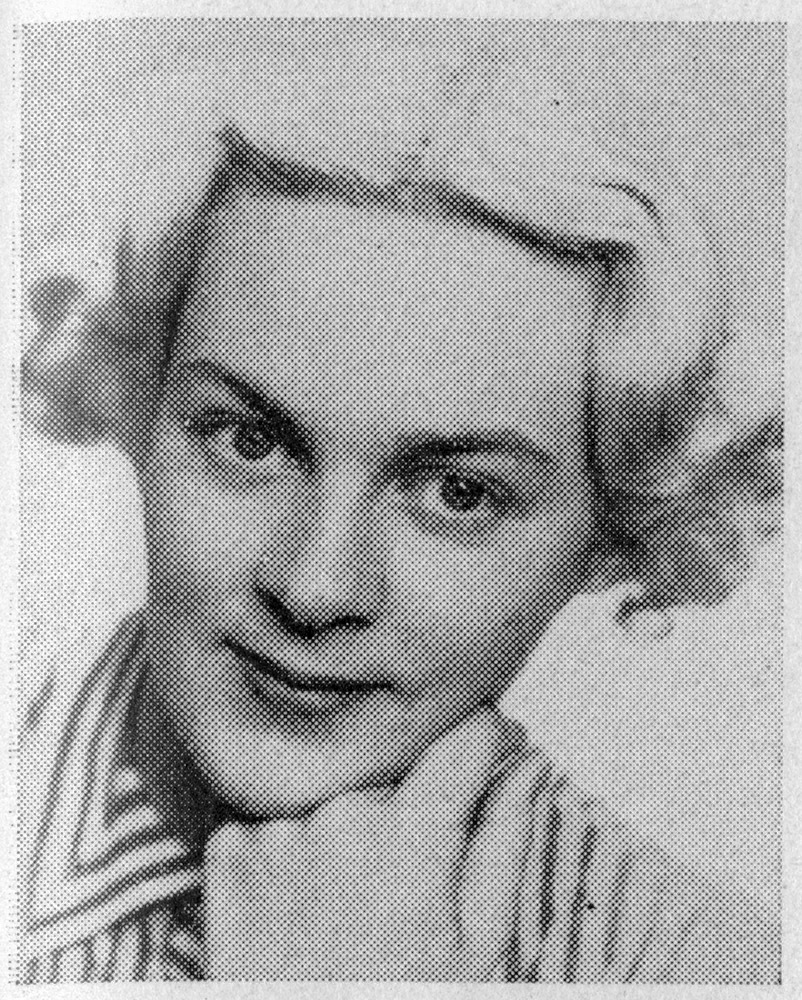Kaj Tenow trained at the drama school of the Royal Dramatic Theatre and appeared in a number of minor roles beginning with the film Greetings (Hälsingar, Ivar Johansson, 1933). But it is as a director that she made her greatest contribution to film. Between 1938 and 1962 she directed 20 short films.
Her career was unusual, yet typical perhaps of those women who wanted to do more than stand in front of the camera. Her route to directing took her via short films, most especially election or propaganda films, where she gained her first substantial assignments as an actor.
Her first leading role came in a 46-minute campaign film for the Swedish Social Democratic party En kämpe faller – striden går vidare (‘A Warrior Falls – The Fight Goes On’), directed by Gunnar Olsson. It was made prior to the Stockholm local elections of 1935. Produced by Svensk Filmindustri, the film premiered at Auditorium in Stockholm, a cinema which included short films in its programmes. Election films were often screened as stand-alones in cinemas and admission was free.
In 1936 she played the lead in another election film for the right-wing party Allmänna Valförbundet, Artur Natorp’s Kärlek och monopol (‘Love and Monopoly’). The following year she appeared in the short Pappa får påökt (‘Dad Gets a Pay Rise’), which was directed by her husband Christian Tenow. Both of them were under contract to SF at the time, she as an actor and he as a screenwriter. Together with Natorp, the Tenows also worked on a coffee commercial Katjas cirkel (‘Katja’s Circle,’ 1939) and a propaganda film for milk, Mjölkens mirakel (‘The Miracle of Milk,’ 1940).
Tenow made her directorial debut in 1938 with the short film Studieresan (‘The Study Trip’), which centres on two farmers wives who are taught how to take care of animals and milk cows, all part of a programme to promote milk that was aimed at Swedish homes and household throughout the entire twentieth century. Perhaps just because she was a woman, many of Kaj Tenow’s films were about products like milk and modern housekeeping, with its new machines and methods. These documentaries can be regarded as a kind of education for housewives, comparable with the extensive new wave of films specifically for housewives which began in the 1950s (and which were usually produced by men).
After 1940 she began to concentrate on directing, and many of her best films quickly followed, such as the documentaries I bärmarkerna (‘In Berry Country,’ 1941) and Eld, lera och människor (‘Fire, Clay and People,’ 1942), the latter about porcelain production at the Gustavsberg factory. Both these films are exquisitely produced, with evocative cinematography by Gösta Roosling och and feature Kaj Tenow herself as narrator. During the 1940s she was commissioned to make a number of films for the Swedish Cooperative Association and two election films for Landsbygdspartiet Bondeförbundet: Vi på Vallberga (‘We at Vallberga,’ 1944) and De unga tar vid (‘The Young Take Over,’ 1946). With screenplays by her husband, all these films were produced by SF, where Kaj Tenow took on the unofficial mantle as Swedish film’s first woman documentary maker.
During the 1950s her directing assignments thinned out, and she only made three films, all of them commissioned by the Swedish Joint Industrial Safety Council. With cinematography by Ingmar Bergman’s cameraman of the day, Gunnar Fischer, the short film En vanlig vardag (‘An Ordinary Workday,’ 1956) was her penultimate work. She directed her last film in 1962.
Kaj Tenow’s contributions as a voiceover talent are also worthy of note, especially since most Swedes think of the clipped tones of the ubiquitous Gunnar Skoglund on newsreels of the period. In 1935 she made her voiceover debut for a couple of fashion reports, including the short film Sommarens mode hos Lejamagasinet (‘Summer fashion at Lejamagasinet’). A later example is I bärmarkerna, in which she conveys a common-sense feel for forestry that was extremely important during the war years.
Mikaela Kindblom (2014)
(translated by Derek Jones)
Basic info
Main profession: Director
Born: 1912
Died: 2001
Active: 1938-1962
Filmography
Regi:
Studieresan (1938)
Plomberad mjölk (1939)
Resan till Romme (1939)
I bärmarkerna (1941)
Vi äter potatis (1941)
Den sparade poängen (1942)
Eld, lera och människor (1942)
Klara konserverar (1942)
Grön front (1943)
Porslinsbruket (1943)
Tre musketöser (1944)
Vi på Vallberga (1944)
De unga tar vid (1946)
Peter and Pat in Lapland (1947)
Karlsson och konjunkturerna (1948)
Evert Taube (1949)
Den onödiga olyckan (1950)
Kalas sa’ Pelle (1950)
En vanlig vardag (1956)
Ingen fara för handen (1962)
Klippare:
Vi på Vallberga (1944)
De unga tar vid (1946)
Roll:
Giftasvuxna döttrar (1933)
Hälsingar (1933)
Stockholmsresan (1933)
Uppsagd (1934)
En kämpe faller ¬ striden går vidare (1935)
Järnets män (1935)
Kärlek och monopol (1936)
Stackars miljonärer (1936)
En flicka kommer till sta’n (1937)
Pappa får påökt (1937)
Katjas cirkel (1939)
Mjölkens mirakler (1940)
Eld, lera och människor (1942)
Speaker:
Eld, lera och människor (1942)
Grön front (1943)
Porslinsbruket (1943)
Budkavle kommer (1944)
